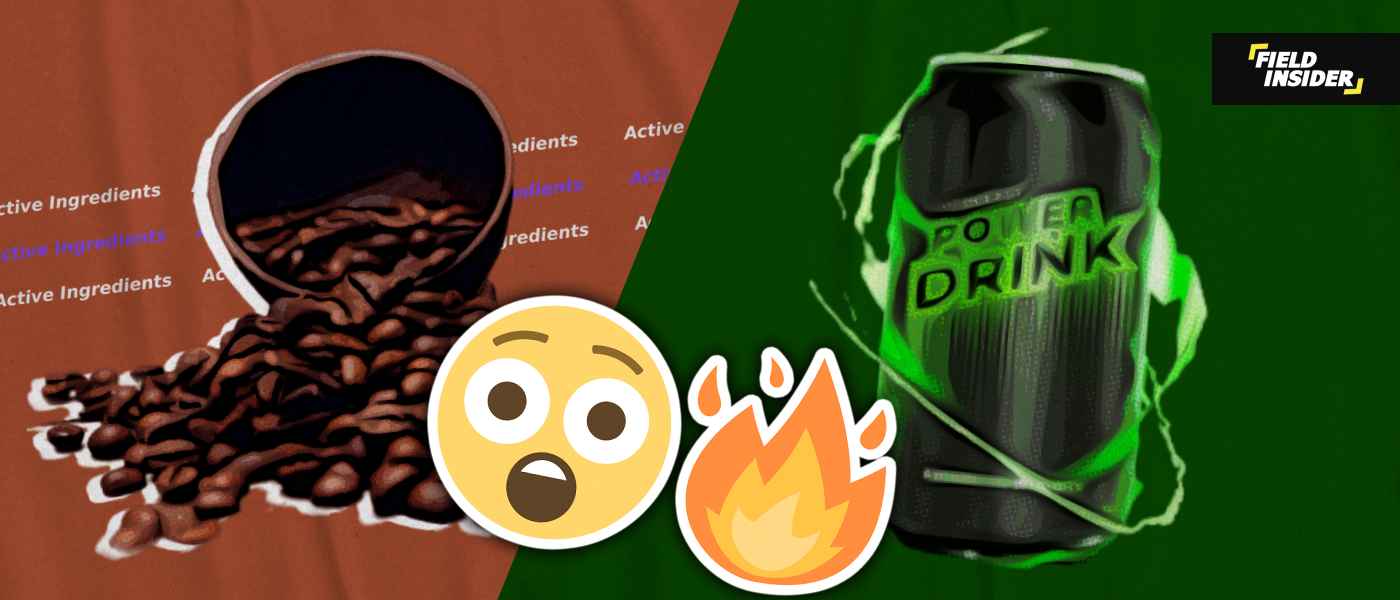The Role Of Energy Drinks In Football: Complete Guide
Are energy drinks in football bad? The average footballer covers about 10.2 to 14 km each game. Add to that playing twice a week for about nine months a year, and you have a rigorous schedule on your hands.
For this reason, footballers ensure that they remain fit and active for their soccer games. To achieve this, they indulge in ice baths, modern training, and extensive diet plans.
Another option football players often employ is the intake of energy drinks. This is because it provides them with instant energy, something that is important during games and training.
Key Takeaways
| Aspects | Key Information |
|---|---|
| Science of Energy Drinks | How energy drinks work in the body |
| Ingredient Composition | The primary ingredients that are found in them |
| Benefits and Harmful Effects | Risks and benefits associated with them |
| Brands | Top brands of these energy supplements in football |
| Alternatives | Other ways to get energy boost during soccer games |
| Pros and Cons | Comparing the pros and cons of energy drinks intake |
Science of Energy Drinks: How They Work
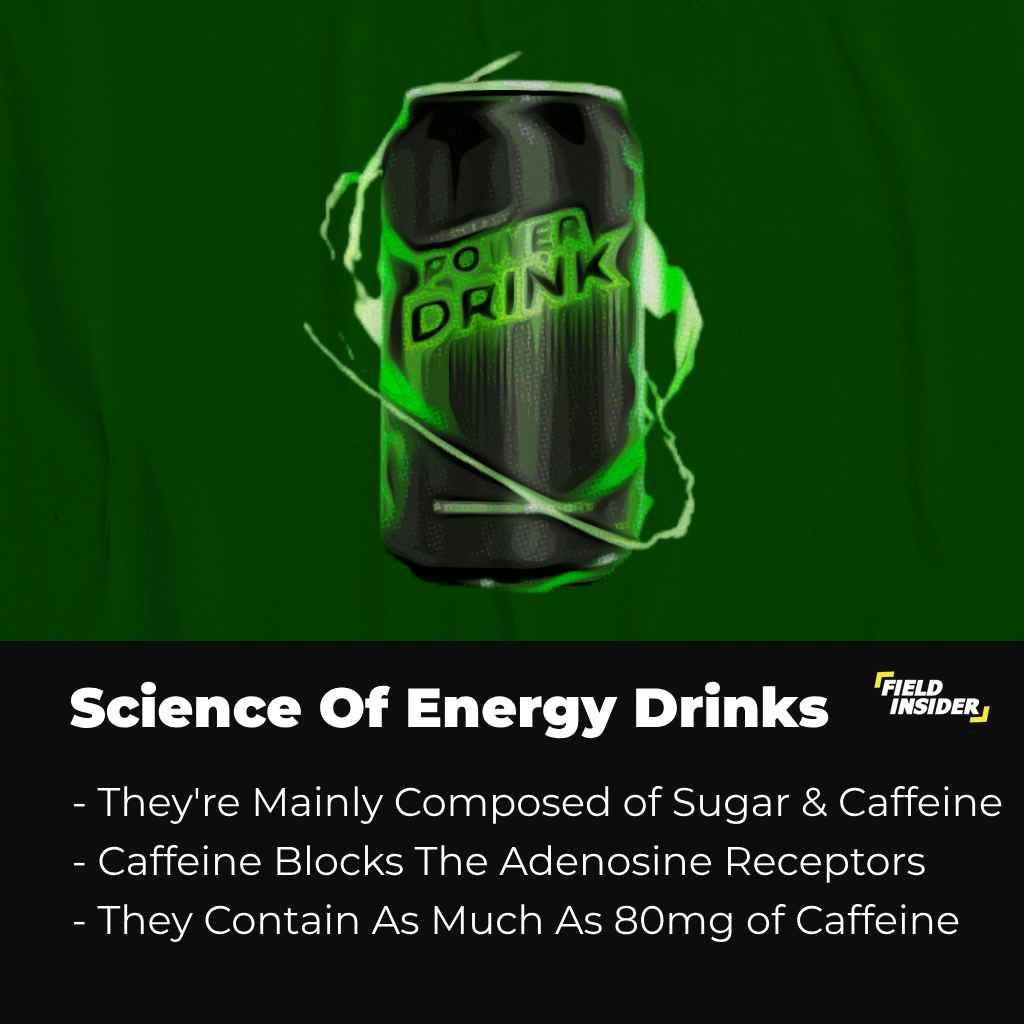
Energy drinks are made of two major ingredients: sugar and caffeine. These two ingredients are packed in high concentration in these drinks to ensure that whoever takes them is left feeling active and energized.
Energy drinks are not the only beverage with a composition of sugar and caffeine; however, when compared with other soft drinks, they pack a whole lot more of these ingredients.
To buttress my point, your average soda contains about 18-48mg of caffeine, whereas a can of energy drink has as much as 80mg of caffeine.
The reason caffeine is used in such high amounts in energy drinks is because it blocks Adenosine receptors in the brain that initiate drowsiness and sleep when activated.
This is why you feel super awake after taking them. Moreover, when combined with the high sugar content, consumers of these drinks get into a hyperactive state.
How Long Do Energy Drinks Last?
The effects of a can of energy drink can last anywhere from 2-5 hours. However, this is not the same for everyone and varies with the amount of energy drinks consumed, the intensity of work done, and body tolerance.
Due to differences in metabolic functions and personal lifestyles, some people tend to experience a longer or shorter boost duration from these drinks.
In addition, the more energy exerted by the body after taking an energy drink, the faster its effects wear off and the body crashes.
What Are the Benefits of Energy Drinks in Football?
1. Quick Energy Fix
In soccer games, it is imperative that players have enough energy to carry them through a game. Since they are constantly moving, sprinting, dribbling, nodding and changing positions, they tend to lose lots of energy.
This is where energy drinks come in. Energy drinks are packed with enough sugar which can then be broken down to give the body the energy it needs.
2. Source of Hydration
Hydration is another benefit gotten from energy drinks. The body loses fluid in the form of sweat and perspiration during games, and without replenishing it, leads to fatigue.
Therefore, along with giving the body energy, it also replenishes the body lost in the form of sweat.
3. Boost Field Performance
The energy and increased body function that ingredients in energy drinks provide give footballers what they need to boost their on-field performance.
This means they are better able to stay and maintain formations, chase after the ball, shoot more efficiently, and even perform slide tackles when defending.
This increase in motor function comes from other ingredients that aid with muscle function and overall activeness.
In a game that lasts for 90 minutes where on-field performance decreases with time, it proves to be a sufficient boost that can influence the outcomes of games.
Common Ingredients In Energy Drinks
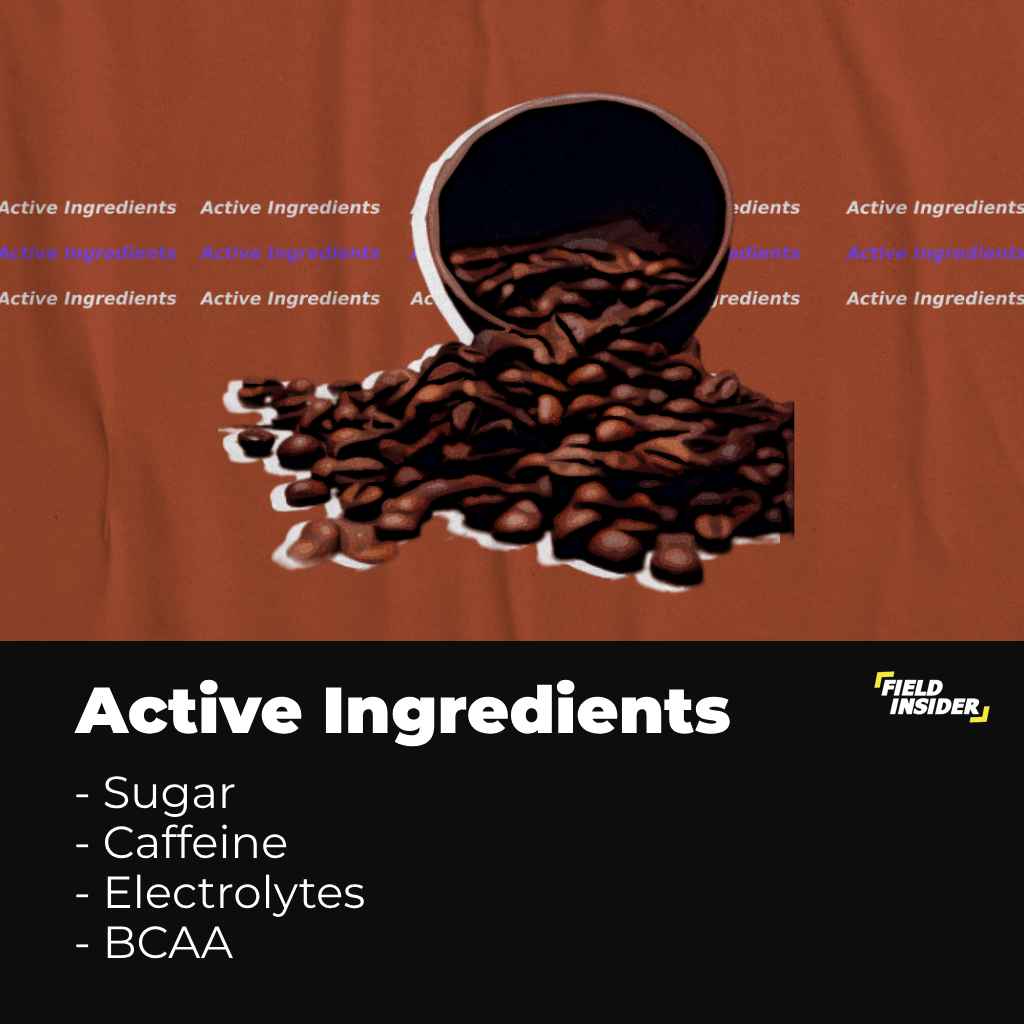
Now that we have looked at some of the advantages that the intake of energy drinks has on football players, let us take a look at some of the common ingredients in them.
1. Sugars
One of the basic ingredients when you talk about energy drinks in football is sugar. Now carbohydrates are of two types, simple carbohydrates (sugars) and complex carbohydrates.
The thing with complex carbs is that they take a whole lot more time to be digested and become a source of energy for athletes.
So, while they may be great for weight loss in the general setting, they may not be suited for football players just before the game when they need energy as quickly as possible.
Sugar as Carb intake
On the other hand, simple carbs are easy to digest and become a part of our muscles to be used during intense activity in no time.
While this quick digestion may be bad for our body during weight loss as these sugars get converted to fat, when you have activity that can burn these sugars, you should consume it.
Since footballers use it just before games when they have to perform explosive movements for about 90 minutes, this ingestion of sugar is more than warranted.
2. Caffeine
The energy drinks in football and other sports also tend to contain caffeine. With this ingredient, caution needs to be exercised. We see caffeine in most of our daily life beverages like tea and coffee.
It is a stimulant of the nervous system and also has antioxidant properties that help prevent cancer.
benefits of optimum consumption:
There is enough research to suggest that caffeine-containing energy drinks in football do carry their benefits.
Research shows that these energy drinks help increase jumping ability, running distance, and other measures of athletic performance.
These metrics are indirect measures of performance on the pitch but do indicate a performance improvement ultimately. Something like jump height can have a meaningful impact on a defender trying to win a header or a striker trying to head it in from the corner.
All these benefits make it a usual recommendation to use caffeine with carbohydrate-rich drinks used by footballers. Having said that, the dose and frequency of caffeine intake are crucial to be regulated.
A similar study suggested the same improvements in athletic performance when caffeine is taken in a dose equivalent to 3 mg per kg.
3. Electrolytes
Footballers play in all sorts of conditions, be it hot or cold. So a common occurrence is the profuse sweating seen during soccer games.
Alongside water, some crucial salts and electrolytes are also lost with sweat. So footballers try to tackle this loss of electrolytes by drinking these energy drinks that contain these electrolytes.
One of the main electrolytes is sodium which is a key electrolyte for our body and is found in the table salt we use in our food.
Like with caffeine intake, there is research that suggests an improvement in performance during games by drinking energy drinks with electrolytes supplementation.
4. BCAA
BCAA also known as “Branch Chain Amino Acid” are nutrients with protein structures that help in muscle metabolism. This protein nutrient is found in some food sources that provide the body with protein.
Despite this, they are also a trending ingredient in energy drinks because they improve muscle function. Why is this so?
Apparently, BCAA is a category of amino acid that is burned during muscle metabolism thereby supporting muscle metabolism and also in building tissues in the muscles.
When speaking on its relevance to sports, BCAA has been known to ease muscle sores, minimize the feeling of fatigue during active participation in sports or exercise, and even prevent muscle wasting.
Aside from the ingredients that are listed above, here are other ingredients that are found in energy drinks.
Other Ingredient
| Ingredients | Effects |
|---|---|
| Taurine | Aids athletic performance and reaction time |
| Guarana | Source of caffeine used to elevate alertness and energy levels |
| Ginseng | Reduces stress levels and improves endurance |
| Creatine | Improves the ability of the body to withstand high-energy activities and contributes to muscle mass gain |
| Electrolytes | Hydrates the body and regulates the body’s nerve and muscle function |
Research and Analysis (Energy Drinks Benefit)
A study published on Research Gate of a Research by the Universiti Teknologi MARA (UiTM) Puncak Alam Campus, Selangor, from April 2019 to July 2020 investigated the benefits and effects of energy drink consumption among students.
Utilizing self-administered questionnaires, the data from 380 students revealed that 57.1% of students consumed energy drinks. It also showed higher consumption among females than males.
From this, it was revealed that male students predominantly consumed Red Bull and Gatorade and reported benefits in physical performance, stamina, reaction rate, and driving ability.
The chart shows the percentage of students who testified to increased performance after consuming energy drinks. This performance increase ranges from increased stamina to strength and even reaction rate.
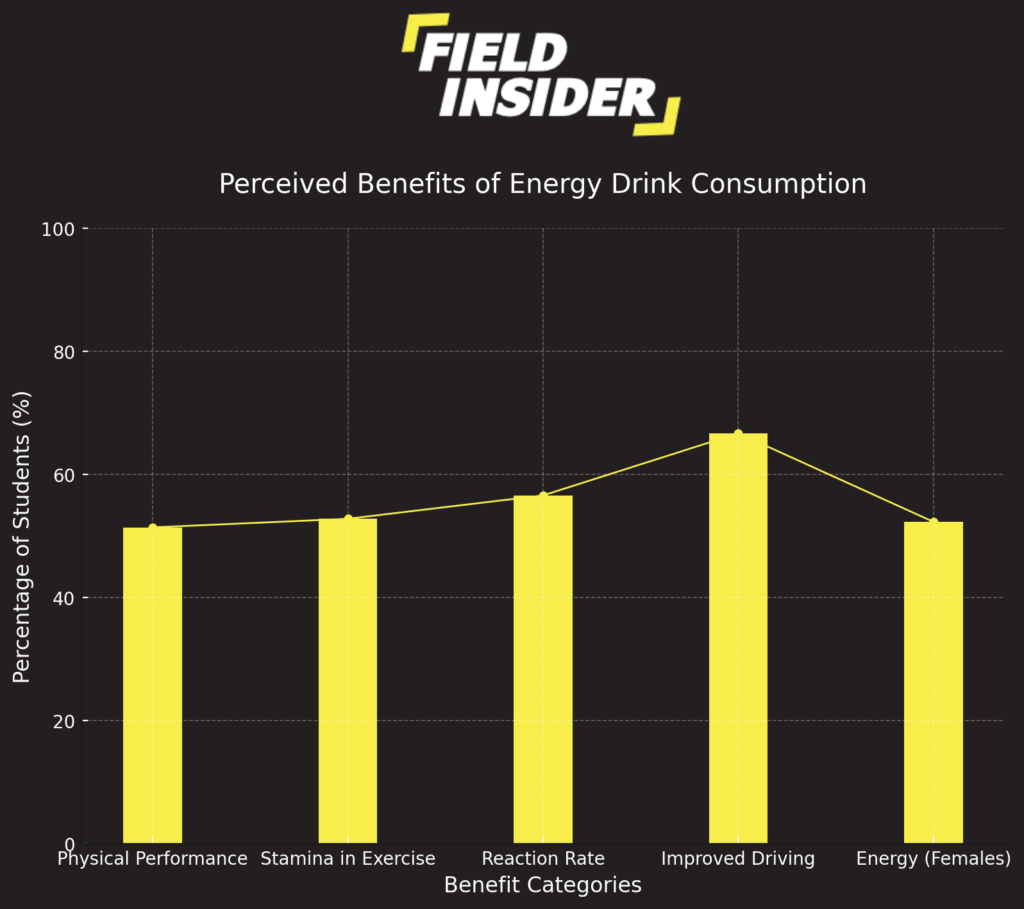
What are the potentially harmful ingredients in energy drinks?
Energy drinks often get bad press for the harmful ingredients in them. And some of it is justified. There are a few ingredients in commonly used energy drinks that can have detrimental effects. Some of them are:
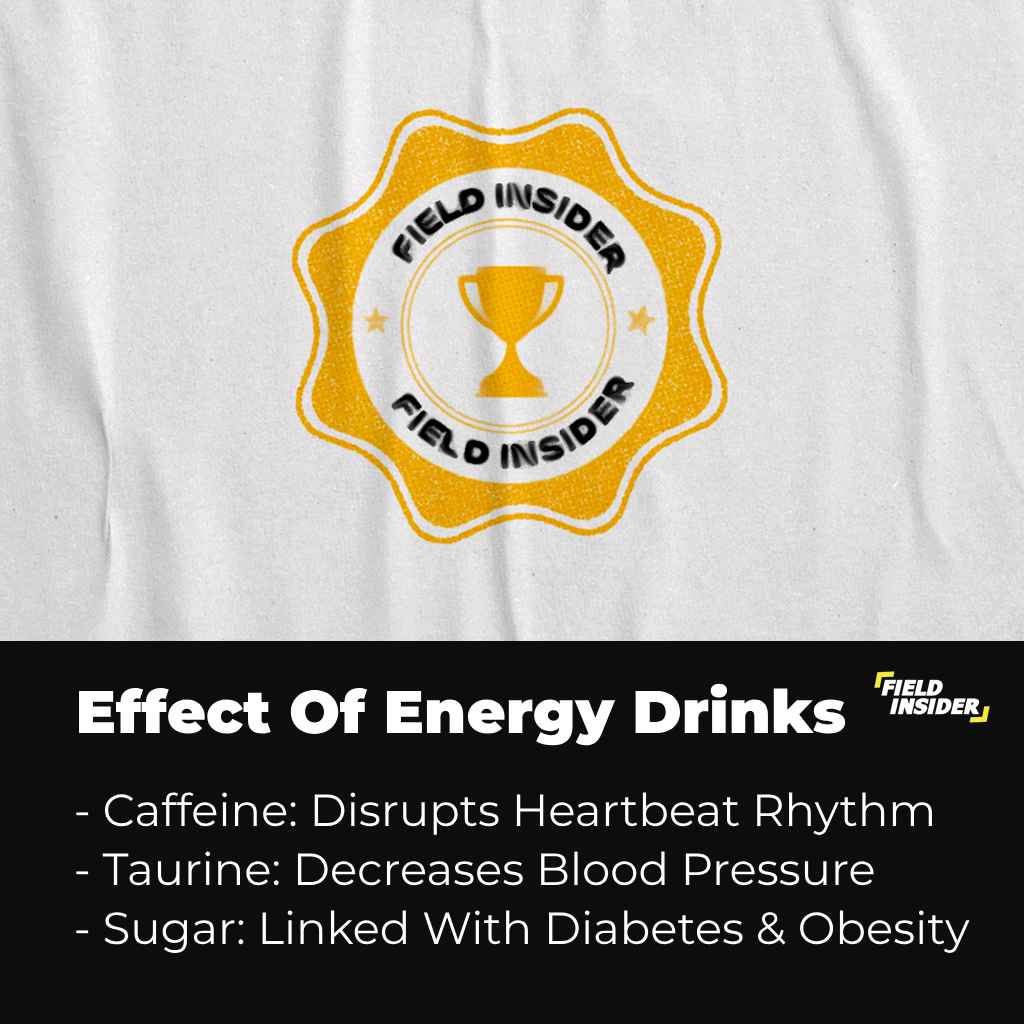
Caffeine
First of all, caffeine itself can have a harmful effect when taken in excess. It is known as a potential cause of increased heart rate and even arrhythmias or disrupted heartbeat rhythm when taken in excess.
Caffeine is also linked with insomnia which may be a huge deal for footballers who depend on adequate sleep for muscle repair.
Tiredness the next day and stomach upset after caffeine use are other side effects commonly reported with the use of caffeine-containing energy drinks in football.
So it is vital only to consume caffeine in moderate amounts and never binge drink any caffeine-containing energy drink.
Taurine
It is another common ingredient found in energy drinks. It is an amino acid and has the advantage of helping with neurological development and can regulate water and mineral levels in the body.
But when taken in excess it can lead to severely decreased blood pressure. And this is just one drawback we know. There is a lot more to be researched about this ingredient.
Ginseng and Guarana
Two other ingredients often seen in energy drinks in football are ginseng and guarana. These are relatively new and much is still unknown about these ingredients.
However, they can lead to high blood pressure, palpitations, and increased heart rate when taken in an uncontrolled quantity.
Sugars
Like caffeine, sugars can be detrimental too when taken wrongly. With sugars the time when they are taken matters massively.
Simple sugars taken without any activity are a recipe for weight gain. The body converts the excess sugar into fats that get stored in the body.
Also, many energy drinks use high-fructose corn syrup as an inexpensive alternative to sugar which is known to be detrimental to human health.
It can precipitate liver damage with fat accumulation in liver cells and is linked with diabetes when taken chronically in excess.
Research and Analysis (Energy Drinks Risks)
In a research titled “The Dark Side of Energy Drinks: A Comprehensive Review of Their Impact on the Human Body” which was published by mdpi.com, the risks associated with energy drinks were discussed.
The analysis found that, out of the study population, cardiac outcomes were the most common, followed by neurological and gastrointestinal outcomes.
Specific cardiac adverse events included arrhythmias, resuscitated cardiac arrests, and acute coronary syndrome, with a median age of 27.7 years among those affected.
For the bar chart, the different types of outcomes among the patients and the percentage of patients that manifest them.
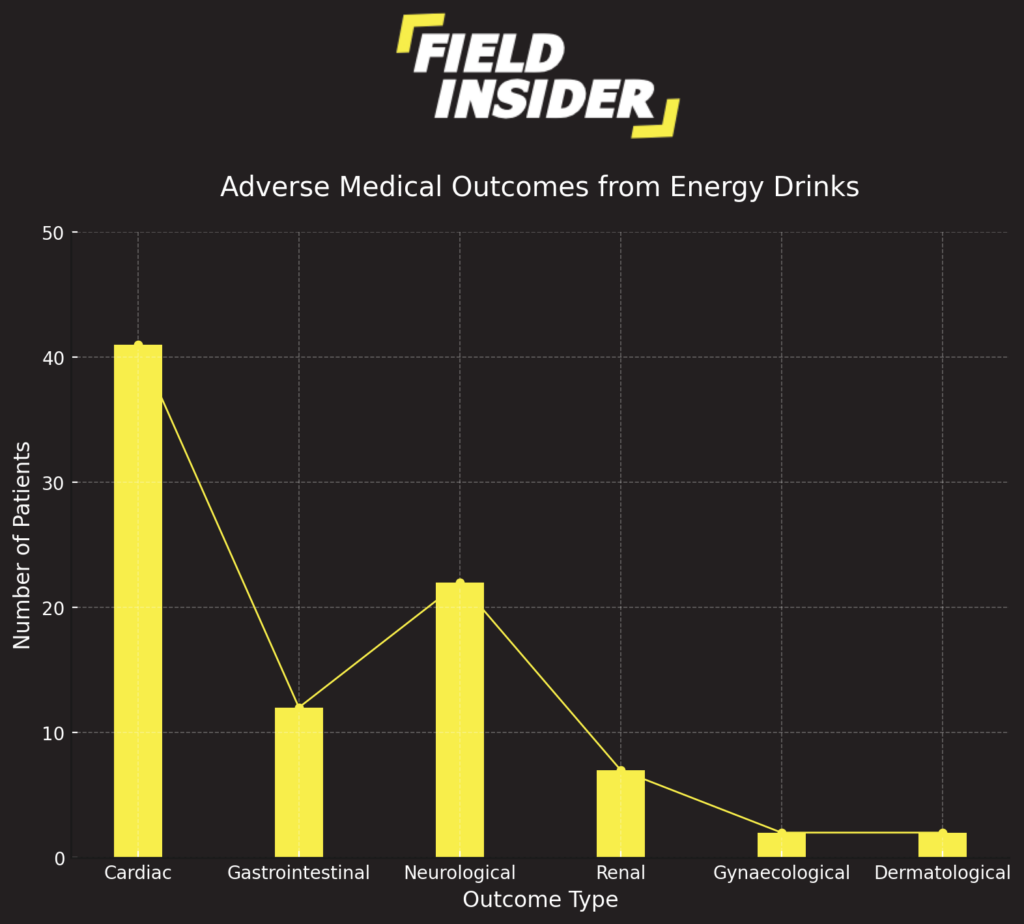
In another section of the same study, a relationship was discovered between energy drink intake and cases of gastrointestinal problems. The category showcased in the study includes cases of,
- pancreatitis (33%)
- hepatitis (41.6%)
- toxic triad syndrome (8.3%)
- hypercobalaminaemia (8.3%)
- atrophic gastritis (AG) and gastrointestinal metaplasia (GIM)
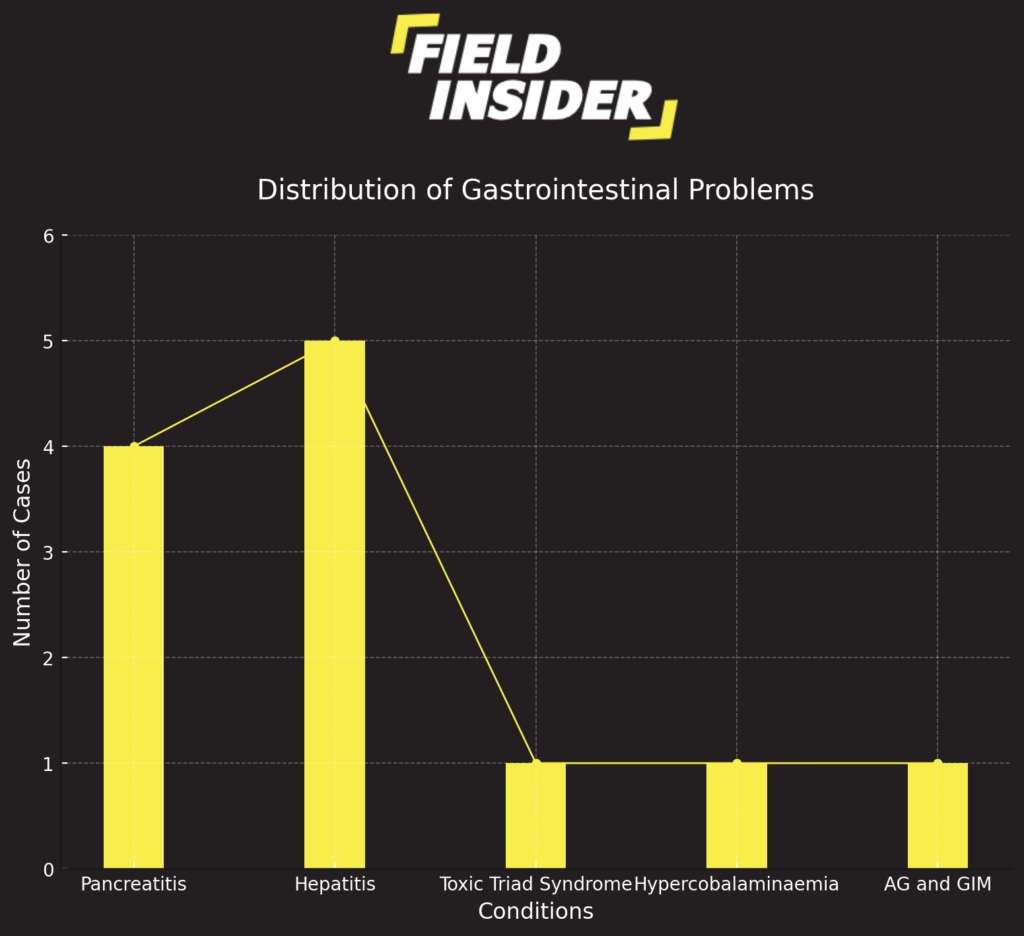
Are Energy Drinks Bad for Footballers?
Coming to the million-dollar question, it depends. It may sound boring but it really does. It depends on the ingredients, the frequency of intake, and the time when it is consumed.
when & when not to consume Energy Drinks
People see footballers drinking energy drinks just before the game and think that they have been drinking them throughout the week. But that is just not true.
Professional footballers only take it before or during a game as they need the stimulation from caffeine and the energy from simple sugars. They burn what they drink right away.
They do not use these energy drinks during the regular training days which only contains a reasonable amount of athletic burden. So an energy drink is not needed.
Taking energy drinks on regular days can precipitate a sort of addiction and withdrawal symptoms of caffeine.
unharmful for athletes?
For the general population, taking energy drinks is not recommended as they do not perform the kind of strenuous activity that footballers are accustomed to. As a result, so much of the simple sugars they take is then converted to abdominal fat.
Playing football for 90 minutes whilst staying fit and maintaining alertness is a daunting task. That is where caffeine-containing energy drinks in football come in handy.
Caffeine gives players the alertness they need and sugars give them the energy to last 90 minutes without suffering a dip in performance.
So an energy drink is used best before the game on match days and not on training days.
Biggest Energy Drink Brands In Football
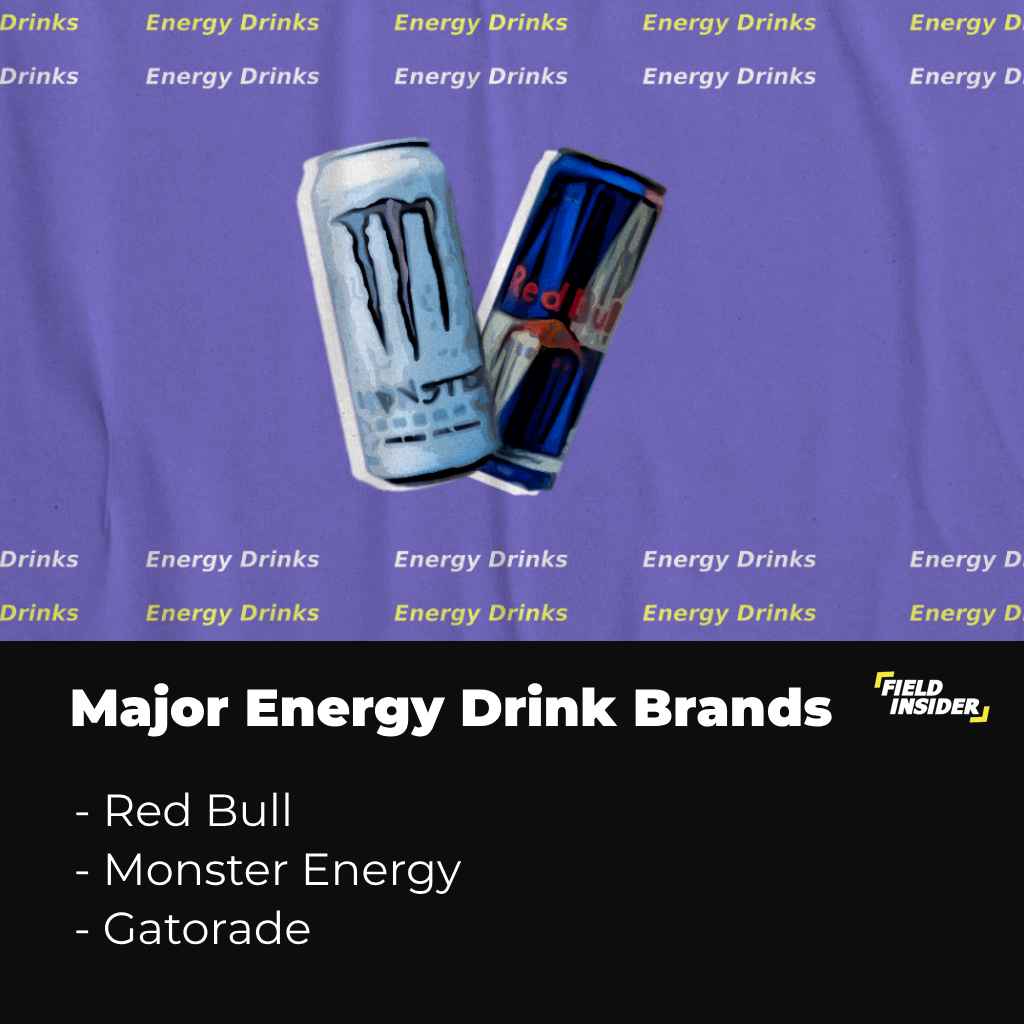
| Ranking | Brands | Number of Units Sold Yearly (2022) | About |
|---|---|---|---|
| 1 | Red Bull | 11.582 billion cans | It is the most renowned energy drink and has made a significant imprint on football through club ownership and event sponsorships. It’s also known for its slogan “Red Bull gives you wings”. |
| 2 | Monster Energy | 8.568 billion cans | Monster Energy is another top energy drink brand that made its impact on football through individual athlete sponsorships. Moreover, it is renowned for its unique blend of ingredients |
| 3 | Gatorade | ($7 billion in sales) | Gatorade is prominently associated with hydration and recovery and Its partnership with FIFA and tailored nutrition for clubs places it high in the football world |
| 4 | Powerade | – | Powerade is another sub-brand of Coca-Cola and has often been seen on the sidelines of major sports events, including football |
| 5 | Lucozade | – | With a strong foothold in UK football, Lucozade has been a long-standing presence in the sport, offering energy as well as sports drinks. |
| 6 | Power Horse | – | On the international scene, Power Horse does not have large numbers compared to its competitors. However, it has still secured sponsorships and endorsements within the European football scene. |
| 7 | 5-Hour Energy | 38.4 million cans | 5-hour Energy is known for its small packaging and quick energy cans. It has also occasionally sponsored football events. |
Pros of using energy drinks as a footballer
- Better Jump Height giving greater heading ability
- Caffeine helps to improve alertness
- Increased sprint speed helping beat defenders
- The simple sugars are a great source of instant energy needed before the game
- Electrolyte replenishment helps to indirectly perform better
Cons of using energy drinks as a footballer
- Possible addiction and withdrawal symptoms like insomnia from the caffeine included in energy drinks
- Possible weight gain if sugars in energy drinks are taken during regular days in excess
- High Fructose Corn syrup mat damage the liver or cause Diabetes if taken chronically
- Ginseng and excess Caffeine may cause palpitations or raised heart beat as well as a raised blood pressure
- There is still much to be learnt about many of the ingredients used in energy drinks
Conclusion
There is no question in the fact that energy drinks in football carry substantial benefit. But with the kind of ingredients they include, caution is definitely required.
They should only be taken before a game when strenuous activity is expected. They should not be taken before training or on regular days. The ingredients should be read with their quantities, and intake should be regulated only as little as needed.
When these precautions are taken, energy drinks in football are a great way to boost heading, sprinting and other aspects of athletic performance during a game.


